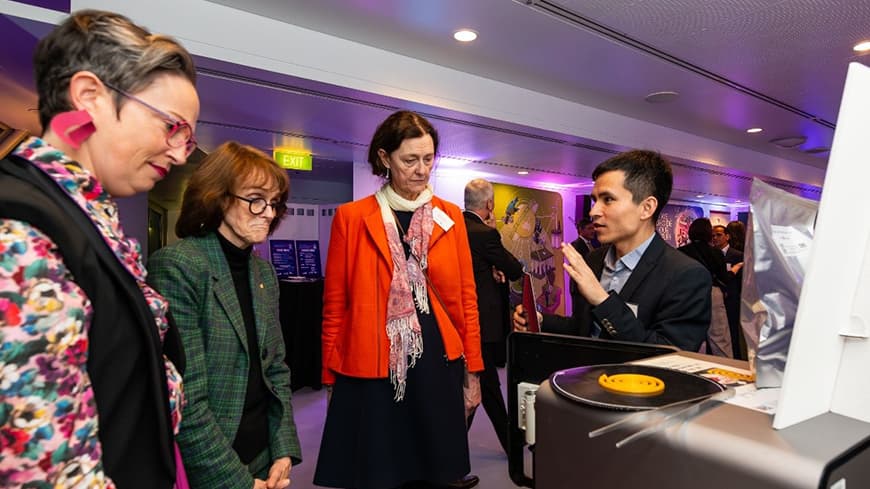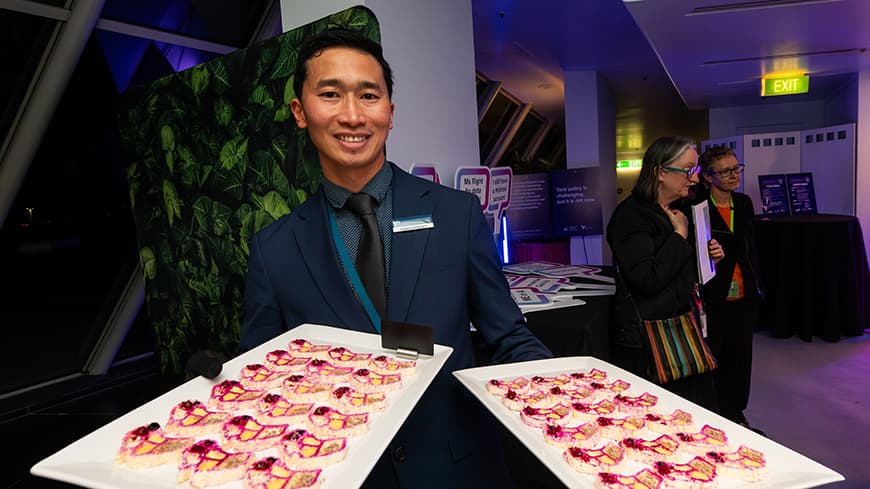Edith Cowan University (ECU)'s 3D printed foods were recently showcased at the Tech Policy Futures event at Parliament House Canberra.
Tech Policy Futures was hosted by the Australian National University’s Tech Policy Design Centre, and brought together politicians, officials, civil society advocates, industry, innovators, and scholars to talk about designing the technology of tomorrow.
ECU Nutrition & Health Innovation Research Institute (NHIRI) Post Doctoral Research Fellow Dr Liezhou Zhong and Research Assistant and Chef, Amanda Orchard are leading researchers in using 3D food printing technology.
They worked with the Department of Parliamentary Services' Director and Executive Chef, David Learmouth, and Chef, Joshua Brown to demonstrate ECU’s innovative food technology and its capacity to address urgent challenges in Australia and beyond.
 Dr Liezhou Zhong explains the 3D food printer to Australia's Chief Scientist, Dr Cathey Foley, the Director of the ANU Tech Policy Design Centre, Professor Johanna Weaver and CEO of Internet Association of Australia, Narelle Clark.
Dr Liezhou Zhong explains the 3D food printer to Australia's Chief Scientist, Dr Cathey Foley, the Director of the ANU Tech Policy Design Centre, Professor Johanna Weaver and CEO of Internet Association of Australia, Narelle Clark.
A new frontier
Dr Zhong explains that 3D food printing is a new frontier in the food industry with the ability to make meals more interesting and enticing to groups who may not get the appropriate nutritional intake.
Produce is cooked and texture modified to create ‘inks’, which are then printed into a range of enticing designs, creating 3D printed foods.
"ECU is using 3D food printing to help vulnerable groups such as aged care residents, remote communities and young children to achieve healthy and sustainable eating, with a special focus on increasing their fruit and vegetable intake," Dr Zhong said.
"Our work also upcycles aesthetically imperfect but perfectly edible and unspoiled produce, which are currently treated as farm waste, into affordable 3D printable food products.
"The approach aligns with a minimal food budget and contributes to Australia's target of halving food waste by 2030."
 ECU's 3D printed 'Signature Cheesecake' was the crowd favourite at the Tech Policy Futures event.
ECU's 3D printed 'Signature Cheesecake' was the crowd favourite at the Tech Policy Futures event.
On the menu
On the menu at the Tech Policy Futures event was a 3D printed 'Signature Cheesecake', petit four democracy sausage, grilled chicken kofta and a green pea vol-au-vent with beetroot fennel and orange 'ink', which incorporated freeze dried fruit and vegetable ingredients.
Event attendees exhibited a mix of curiosity and excitement, with the 'Signature Cheesecake' as the crowd favourite.
"This was a white chocolate and rose cheesecake printed in the shape of Australia, then filled with pastry creams, lemon curd and fluid gels," Amanda said.
"It's a blend of delicate white chocolate sweetness combined with floral hints of rose, complemented by the rich, creamy textures of pastry creams and lemon curd which created a memorable culinary experience."
3D foods in the future
ECU's showcase of 3D printed foods at the Tech Policy Futures event brought to light the innovative role 3D printed foods play in promoting healthy, accessible and sustainable eating.
ECU NHIRI researchers are bringing together world-renowned researchers across aged care, nutrition, dietetics, healthcare, food science and technology to work alongside agriculture industry partners and chefs to utilise 3D food printing and freeze-drying technology to develop novel foods.
"We are aiming to establish a new food system facilitating the real-world application of 3D food printing, using aged care settings as an exemplar, from farm to table," Dr Zhong said.
"For the first time, 3D printed food technologies and food formulations will be easily implementable and standardised, contributing to the improvement of eating experiences, nutrition and health of various groups, including people on texture modified diets such as those with dementia, multiple sclerosis and other neurodegenerative disorders, stroke and cancer survivors, and children with autism."
Find out more about the ECU Nutrition & Health Innovation Research Institute and 3D printed foods.

 Dr Liezhou Zhong and Amanda Orchard at the Tech Policy Futures event.
Dr Liezhou Zhong and Amanda Orchard at the Tech Policy Futures event.


